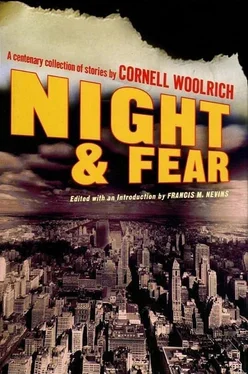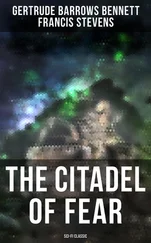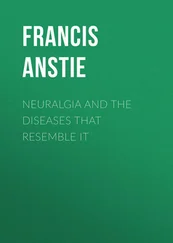“He’s probably in bed,” I said crossly.
“Hell, he don’t have to be that realistic. He’s on an assignment.”
“All right, see if you can get in touch with him then. Get word to him to bring the dame in, we’ve kibitzed around enough with her.” I wondered what I was going to hold her on. But I had to have somebody; it was her tough luck she’d once asked the way to Trinker’s house two months ago.
But all this was just a side issue now to the main problem. I kept saying to myself: “The bandstand by the lake — in the park. I’ve got to get him. I’ve got to get him and shut him up.” I only knew of one way to shut him up, to shut him up so that he could never menace her again. I only had to look at her, sitting there gripping her chair, suffering the tortures of the damned, to know that I was going to take that way.
I moved with pretended casualness into my own room. She didn’t seem to be watching, didn’t seem to be aware of what I was doing. I took my gun out and pocketed it. I came out again, still casual, moved past her toward the door. I mumbled something like: “Got to go down to the job again. Stay here until Maggie comes back...”
I don’t know whether I’m not a good actor or whether it was feminine intuition. But suddenly she was up, her arms were around me like barnacles, trying to hold me, trying to keep me back. “No! I know where you’re going! I know what you’re going to do! I can tell by the look in your eyes! You took your gun! Daddy...”
I thrust her aside, but she tried to hang on. I just kept stomping forward, with my face expressionless, dragging her after me down the hall like so much dead-weight. She was going wild now, hysterical. I reached up over my shoulder, pried her hands off me, held the two of them together by the wrists with one hand, pulled her into a little windowless spare-room we had off the hall. I locked the door on her in there, took the key out. She was beating a frantic tattoo on it, almost incoherent, calling for help from someone who wasn’t there. “Aunt Margaret, stop him! He’s going to kill someone!”
The phone started up again, just as I opened the outside door. That wouldn’t be the precinct, so soon again. There was, I remembered, a hot-dog concession at the park entrance, open until midnight every night. It provided refreshment for homeward-bound spooners. It provided a pay-phone, too.
“Coming, damn you, coming,” I growled as I closed the door after me and lurched heavily out into the street. Everyone protects their own, even police-captains.
The lake came into view as I followed the curving driveway, and the deserted bandstand was outlined against the stars. There were no more leaves on the trees, no boats on the water, no cars in motion along the driveway. It was too late in the year for the park to be used for anything — but blackmail and murder.
Two things glowed red ahead of me as I came along; the ruby tail-light of the car standing motionless in front of the bandstand, and the smaller gleam of a cigarette under the black sheltering roof of the structure. The number checked with the one I had in my notebook, the one I had taken from the car that had gone slowly past our place this morning. I didn’t have to refer to it, I knew it by heart. 060210. So his name was Charles T. Baron, was it?
I kept the motionless car between me and the bandstand as I soft-shoed up on him. So he wouldn’t catch on, break and run. Then when I was up to its rear fender, I came out around from behind it, went up the two steps into the bandstand, with my gun out. I said, “Come here, you.”
He was a silhouette against the lake through the open sides of the structure. I saw him jump with shock, and his cigarette fell down in a little gush of red sparks on the floor.
I didn’t wait for him to come to me. I went to him. I said, “Is your name Charles T. Baron?” He didn’t have to answer if he didn’t want to. It wasn’t, important. The real answer was behind my curved finger-joint, anyway.
I said, “D’you know me? D’you know who I am?” He was too frightened to answer, could only shake his head.
I did want the answer to what I asked him next. My mind was a policeman’s mind, not a congenital murderer’s; it had to have its confession before it executed justice. “Did you see her last night? Did you see her — with this?” I hitched the gun-muzzle upward to emphasize it. “You know who I mean.”
I was gripping him by the shoulder with my other hand, holding him in place in front of me. He could hardly articulate with terror. He’d seen the glint of the gun by now, if he hadn’t before. “Yes,” he breathed, “I... I saw it go off...”
That was his death-warrant.
I pulled the trigger and it flamed out, lighting up his eyes, dilated with unbelieving horror.
It had a terrific kick to it, worse than I’d ever remembered — it was so long since I’d fired it last. Such a kick that it pitched upward, the bullet going off harmlessly over his shoulder instead of into his chest. I tried to right it, bring it down again, so that second shot would take effect, and I’d lost control of my arm. All kinds of hands, that didn’t belong to me and didn’t belong to him either, were grabbing me all over.
Holding my gun-arm stiffly up and away, twisting the gun out of it, pulling me back away from him, holding my other arm fast at my side.
Holmes’ voice was pleading in my ears, like a frightened kid begging off from a licking from his old man: “Don’t, Cap! This is murder! What’s the matter with you, what’re you trying to do? Hang onto him, now, officer, don’t let him get that gun.” He was almost sobbing the words.
He got around in front of me and all I could see was his face, not the other guy’s any more. He didn’t actually have wet eyes, but he had the whole screwed-up expression that went with them, like I was breaking his heart.
I growled, “Get out of my way, Holmes — don’t do this to me. I’m asking you as your captain, don’t do this to me! You don’t understand — my little girl...”
He kept pushing me back in front of him, not like when you fight, but sort of leaning up against me, crowding me. He crowded me back out of the bandstand, and the running-board of the car caught me below the calves of my legs and I sat down on it involuntarily. He leaned over me, talking low into my face. “It’s Holmes, Cap, don’t you know me?” he kept saying. “You’ve nearly killed a man, Cap.” He started to shake me a little, as if to bring me to. “What do you want to do, bust my heart? Don’t you know how we all look up to you? Endicott, Endicott, what do you want to do?”
All I gave him back was, “My little girl, my little girl...”
“But he’s just a kid, Cap,” he said. “Don’t take your gun to him.” There was a motionless form lying on the bandstand-floor in there, with the policeman bending over him trying to bring him around. He’d fainted dead away from fright.
“Just a kid?” I said dazedly. “He’s a resort-operator, he—”
He kept shaking me slightly, like when you try to wake someone up out of a sleep. “Naw, that’s his father,” he said disgustedly. “This is just a kid, a high-school senior. Even the car is his old man’s. If he didn’t go around wearing a misplaced eyebrow on his lip, anyone could see how young he is!”
I ducked my head suddenly, covered my face with both hands. “But you don’t understand,” I said through them.
“ I understand,” he assured me, hand on my shaking shoulder. “I’m not a parent, but I guess I know how it is — you just naturally get all burnt up the first time they fall in love. But hell, Cap, suppose they were sweet on each other, suppose she did go around with him after you forbid her to, suppose she did sneak your gun out of the house to show it to him and then it went off accidentally while they were jiggling it around and they nearly got hurt — suppose all that? Don’t take your gun to the brat, Cap! That’s no way. You been working too heard...”
Читать дальше












